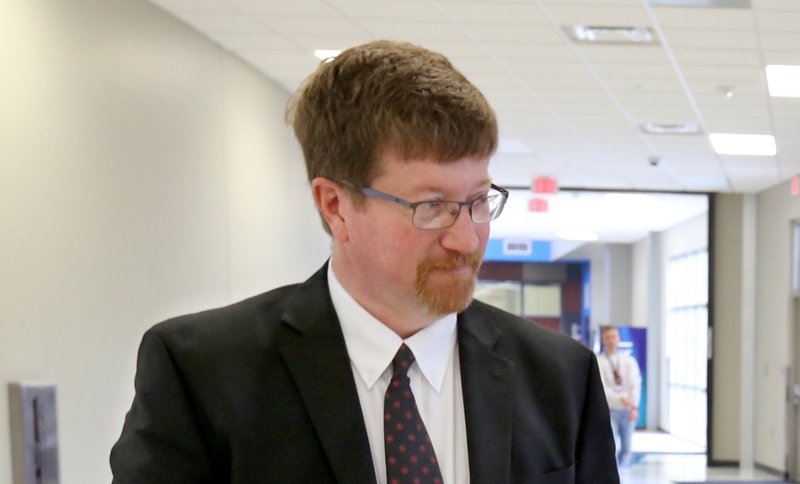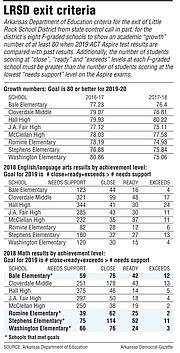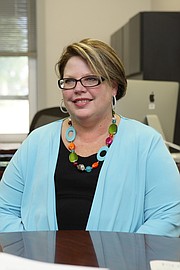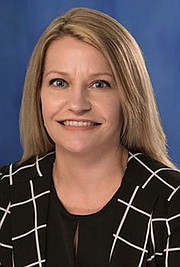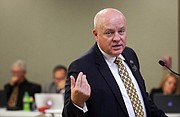Monday marks the beginning of the ACT Aspire testing window for Arkansas' public school students in grades three through 10.
Between Monday and May 10 about 300,000 students will take to their laptop and desktop computers to demonstrate -- in what will amount to about 4½ hours of testing per person -- their mastery of the English, reading, writing, math and science skills on the state-required exams.
The stakes are particularly high for the Little Rock School District, which has operated under state control with a state-appointed superintendent and no locally elected school board since January 2015.
As it stands in current state law, the district has five years -- until next January -- to show it meets criteria to exit Level 5-intensive support -- or face annexation, consolidation or reconstitution. (As of Friday, there were efforts in the state Legislature to lengthen the time a district can be operated by the state.)
State education leaders have in large part tied the Little Rock district's release from state control to the performance of eight of its schools -- each of which received F letter grades from the state last year -- on this year's ACT Aspire exams.
The affected schools are Bale, Romine, Washington and Stephens elementaries; Cloverdale Middle; and Hall, J.A. Fair and McClellan high schools.
Each holds an F grade based on a combination of 2018 ACT Aspire test results, the lack of improvement in 2018 compared with past years, and school quality/student success factors, such as student attendance, participation in Advanced Placement courses, and graduation.
Arkansas Education Commissioner Johnny Key and his staff announced in February the qualitative and quantitative criteria for the district's release.
The qualitative measures for the eight schools call for evidence of collaboration among educators, of consistent use of specific instructional practices and employee evaluation systems, as well as adherence to state education standards and management of resources to support teachers and increase student achievement.
The quantitative measures call for each of the eight schools to achieve an 80 or better in the measure of the academic growth over past years. An 80 signifies that students at a school on average made as much academic growth in the current school year as they did in the preceding years, be it a full year's growth or something less than that.
The quantitative measures also call for the total number of students achieving at "close," "ready" and "exceeds" levels on the upcoming exams at each of the eight schools to surpass the number of students who score at the lowest "in need of improvement" level on the Aspire exams.
"We want it to be simple -- simple to understand and something that makes sense to people," Mike Hernandez, the state superintendent of the office for intensive support and services, said last week about the criteria for district release from state control.
"Should teachers be collaborating and have a say in what they are doing everyday?" he asked and then responded "Yes," in describing the qualitative measures.
"Should they know how to teach? Yes," he continued. "Should they be supported and evaluated? Yes. Should they have curriculum? Yes. Should we be spending our money appropriately for kids? Yes.
"There's no magic," Hernandez said about the measures.
"Just hard work," said Deborah Coffman, assistant state education commissioner for school accountability.
"The right work," Gina Windle, the Education Department's chief of staff, added.
Little Rock Superintendent Mike Poore last week called the criteria "very fair" and a reasonable extension of the requirements from the federal Every Student Succeeds Act that holds schools and districts nationwide accountable for student learning.
"I haven't been in any district where educators aren't excited about being looked at on the basis of 'What did I do this year?'" Poore said. "It's a positive of this exit criteria that growth is such a key component."
He also said he likes the emphasis on moving students out of the lowest performance level on the tests -- because students achieving at the higher categories are truly ready or prepared to move on.
Poore had no argument with the February announcement of the exit criteria -- coming just two months before the annual testing begins.
"It didn't change our delivery, our work or our level of intensity," he said of the timing.
He acknowledged that many district employees don't have a deep understanding about the targets for exit. But regardless of that, he said, the district has been working all along to change the trajectory of student achievement.
It's doing that by using student data, allowing educators to collaborate about instruction, supporting teachers with professional development -- particularly in the science of reading -- and creating a school climate where students and teachers want to be.
He said he will be very disappointed, "even shocked," if there aren't gains in student achievement on the upcoming exams. He is basing that in part on the interim testing of students that the district has done this school year.
"Would it have been nice to have [the exit criteria] two years ago?" Poore asked. "Probably so. It would have given us a better idea of where the lines are and what you have to do to get above the lines."
But he also said that the federal law and the Aspire exams are relatively new and are more rigorous academic measures than what existed in 2015 when the district was taken over by the state.
"That's a positive. It's changed our scores and some people may say we aren't doing as well. It's OK because it is real and it's set at a standard that measures us more in line with where we are in the nation.
"In Little Rock, we don't want to make excuses. We just want to get better. I really believe that is going to happen," he said.
The mantra at Bale Elementary this year has become #BaleandBeyond, Principal Roxie Browning said about the efforts of her staff to prepare children not only for the tests, but also for the next grade level, next school and careers.
Browning began work at the 420-pupil school just last summer after working at Hall High School and, before that, in the school-improvement section at the Arkansas Education Department.
This week will be spent in part firing children up for the tests that will start April 15. Motivational speakers and a teacher talent show are in the works.
"Right now the mood is everybody is excited about getting this testing done," Browning said.
But it's been a school year that started with assessing the needs of individual pupils and then "hitting reading hard," she said last week in describing the emphasis on phonics and reading comprehension during the school day and in after-school tutoring.
Along the way, there has been teacher collaboration through professional learning communities and assistance from district and Arkansas Department of Education staff members to put in place sustainable systems for teaching and learning.
Hernandez at the state Education Department also noted the state's provision of people and resources to help the district, Hernandez said.
"It's very much an 'all hands on deck' effort -- trying to get folks there on a regular basis to support the district," he said.
For example, state agency staff members have been involved in training on teacher and principal evaluation and improvement systems, he said.
State agency staff members also were in the district last week to help alleviate any accreditation problems, he said.
And agency staff members are helping with the district's student-behavior interventions, working to support the district's dyslexia and special-education services, and aiding in the selection of new textbooks for literacy.
Sheila Whitlow, the assistant state superintendent for office of coordinated support and services, spends about three days a week in the Little Rock district to coordinate that support and otherwise help the district in moving forward, Hernandez said.
"To sum it up, we're not just trying to fix, we are trying to solve," Coffman, the assistant commissioner for public school accountability, said about the state resources to the district.
"Could we go in and fix some of these? Yes," Coffman said. "But when we leave, the people are not going to know how to do it better so it doesn't reoccur. The more we can teach people and help them to learn how to solve these problems, then it is more likely we'll see that sustained."
A Section on 04/07/2019
